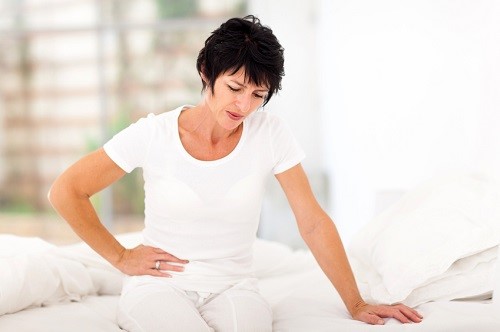It has been observed that symptoms like abdominal cramps after bowel movements are quite common among the general population. In a number of cases, it has been observed that the poorly explained abdominal pain and gnawing cramps are also associated with embarrassing complaints like itching in the anal region or discharge, needless to say that these symptoms can greatly alter the quality of life of these individuals. Although, in some patients the symptoms of discomfort and abdominal cramping after pooping resolves spontaneously, but if your complaints persist, it is highly recommended to seek the help of a medical practitioner.

Abdominal Cramps After Bowel Movement, Why?
Discussed below are some frequently reported causes of recurring abdominal cramps after pooping.
1. Constipation
- Constipation is a motility disorder of gastrointestinal tract that is characterized by the passage of extremely hard or dry stool at infrequent intervals. The passage of hard stool can lead to over-stretching of the area around the anus and rectum. Additionally, more forceful rectal contractions are needed to excrete hard feces from the rectum that may result in severe pain after bowel movements.
- It is one of the most common causes of abdominal cramps after pooping. As the rectum is not completely emptied, the feeling of incomplete evacuation can further contribute to pain development and abdominal discomfort.
- This motility disorder can be adequately managed by consuming large quantities of fiber and optimal hydration.
2. Hemorrhoids
- Also referred to as piles, it is a vascular condition that is characterized by the swelling of veins present around the anal opening, which is primarily a result of long-standing and poorly managed constipation. Severe pain in anal region along with abdominal cramps may be reported in some patients; however, in most cases hemorrhoids are painless.
- The hemorrhoids may be internal or external. Internal hemorrhoids are present inside the rectum and are usually not visible on the external surface. External hemorrhoids are caused by swelling and inflammation of superficial veins around the anus.
Hemorrhoids are normally not serious and there are lots of treatments that offer great relief. Some of those effective treatments are listed here: http://www.md-health.com/Best-Treatment-for-Hemorrhoids.html
3. Anal Fissures
- Anal fissure is also implicated as an important and frequently reported cause of abdominal cramps after bowel movements. Anal fissure is characterized by the tearing of the anal lining (also referred to as anoderm). In poorly managed cases, the tear may extend to muscular lining of the anal canal leading to recurrent episodes of bleeding, severe constipation and excruciating pain after each episode of defecation.
- Anal fissure is almost always associated with chronic constipation. Passage of hard stools can damage the anal lining, thereby leading to anal fissure. Additionally, severe diarrhea can also damage the anoderm leading to anal fissure.
4. Anal Fistula
- The anal fistula is referred to as the formation of a channel or small communication between the infected anal glands and anal surface. The fistula formation is the result of poorly managed anal abscess - a condition marked by chronic inflammation of the anal glands due to blocked or clogged ducts.
- Individuals with a chronic history of diverticulitis, crohn’s disease, and sexually transmitted disease are at much higher risk of developing anal fistula. Abdominal cramps along with severe irritation, pain, fever, and bleeding are also reported in anal fistula.
5. Proctitis
- Proctitis is characterized by the inflammation of rectal lining that is often a result of sexually transmitted diseases, severe trauma to anal or rectal region, or inflammatory gut conditions like ulcerative colitis etc.
- The symptoms of Proctitis include abdominal pain after bowel movements, bleeding associated with fever (usually intermittent) and diarrhea alternating with constipation.
6. Inflammatory Bowel Disease
Inflammatory bowel diseases include ulcerative colitis and crohn’s disease.
- Ulcerative colitis is the inflammation of colorectal lining leading to urgency in bowel movements that is often associated with abdominal cramps and bleeding in stool.
- Crohn’s disease is the inflammation of gastrointestinal tract (anywhere from mouth to anus) with symptoms like severe cramping pain in abdomen, nausea and vomiting.
7. Food Intolerance
Many foods can produce the symptoms of hypersensitivity reaction due to their capacity to induce the production of inflammatory mediators. Food sensitivities can also present with cramps in stomach especially after bowel movements, in addition to gas, bloating, diarrhea, nausea and vomiting. Irregular bowel movements can also occur due to irritable bowel syndrome.
Others’Stories on Abdominal Cramps After Bowel Movements
- "I know most people think that tropical fruits always help in abdominal cramps (especially in the setting of severe constipation). But experts recommend avoiding excessive intake of banana or papaya due to notorious “cooling effect” to the body. Make sure to drink plenty of water after eating these fruits. Warm foods including burgers, cookies, grilled and fried foods and elements containing chocolates should not be taken as they further slowdown the digestion process and can result in worsening of your condition. You should take these natural remedies 3 days to weeks for effective results."
- "I also want to see if anyone else is facing these symptoms. I experience dreadful cramps with extreme pain in the lower-left area of colon after each episode of bowel movement. I have tried many methods (including healing pads), nothing except painkiller works. At first, I used Humira but after no change in symptoms, I started using Percocet. Although I did experienced some relief but I am definitely not interested in using it for the rest of my life. Moreover, it is becoming less effective with increasing use (probably because of the phenomena of drug tolerance)."
- "I would always suggest visiting multiple doctors for second opinion, my 1st doctor continuously prescribed me painkillers that had no effect on my cramps. But the new doctor I visited found that painkiller cannot solve this issue. Please, always inform your second doctor about your previous treatments, and always request a colonoscopy and other similar tests to ascertain the actual cause. Wish you best of luck."